LONDON: Protests in the Syrian city of Suweida have been going on more than a month now, with crowds usually gathering in the central Al-Karama Square, calling on the government in Damascus to implement economic and political reforms.
On Friday between 3,500 and 4,000 people rallied in the southern city — the largest in nearly a month of anti-regime demonstrations that have intensified as Syrians reel from the economic impact of war.
The demonstrations in Suweida and nearby Deraa — where the 2011 uprising began — started after President Bashar Assad’s regime reduced fuel subsidies and raised gasoline prices by nearly 250 percent in August.

Hyperinflation is just one of the many problems Syrians are forced to deal with in their day-to-day lives. But it is no ordinary challenge given that an estimated 90 percent of Syrian citizens in government-held areas now live below the poverty line, and half the population faces food insecurity.
Aside from dire economic conditions and poor living standards, Syrians are also frustrated with their continuing lack of basic rights.
“Undoubtedly, recent economic decisions have sparked the protests, yet society is on the brink of turmoil because the problem extends beyond mere living demands,” Ayham Azzam, head of the Suweida-based Juzour civil society group, told Arab News.
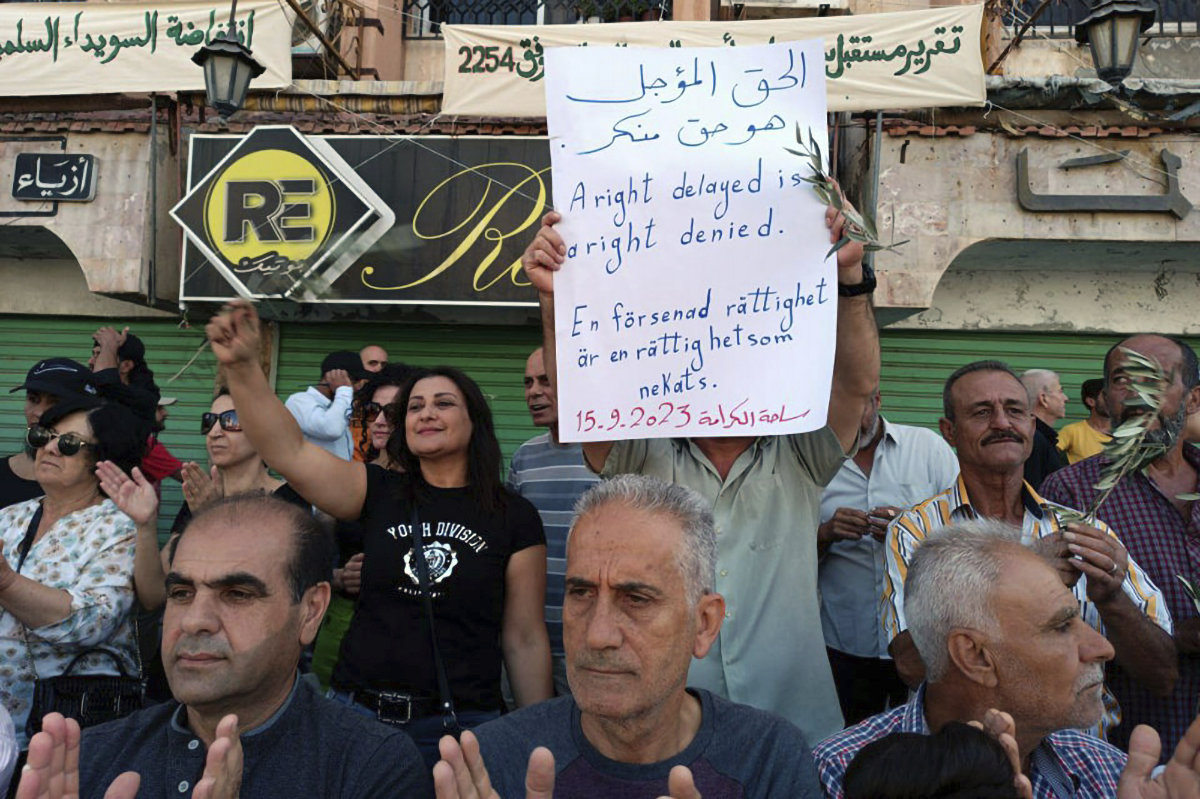
People protest in the Syria’s southern city of Sweida on September 5, 2023. (AFP)
The protesters have wider demands beyond economic ones, which include “political, social and civil rights, as well as public freedoms and the release of detainees,” he added.
On Friday, the media outlet Suwayda24 published videos showing thousands of men and women chanting anti-regime slogans and waving Druze flags. Although the protests remain confined to southern cities, observers said they are reflective of political sentiments prevalent across the country.
“While large-scale public demonstrations remain relatively scarce, there is a noticeable shift in the Syrian populace’s willingness to openly and boldly voice criticism of their government and leadership,” Camille Otrakji, a Syrian Canadian analyst, told Arab News.

A handout picture released by the Suwayda 24 news site shows people protesting in the southern Syrian city of Sweida on August 25, 2023. (Suwayda 24 handout/AFP)
In August, the Syrian pound fell to a record low on the black market of 15,500 pounds to the dollar, according to state media. The official state bank rate is 10,800 pounds to the dollar.
The government has doubled public-sector pay, increasing the minimum monthly salary to 185,940 pounds, the equivalent of about $22. However, this has done little to lessen the privations experienced by those living in government-held areas, who have had to tighten their belts.
“By lifting subsidies, the government continues its withdrawal from supporting poor and needy households and proceeds further in transferring the economic burden onto civil society, expatriates and humanitarian organizations,” Mohammad Al-Asadi, a research economist for the Syrian Center for Policy Research who is based in Germany, told Arab News.
FASTFACTS
Protests erupted in the city of Suweida after the government slashed fuel subsidies.
Economic situation deemed worse now than at the height of civil war that began in 2011.
With about 70 percent of the Syrian population requiring aid, according to UN figures, local charities are struggling to meet the growing demand.
During a recent visit to Damascus, Geir Pedersen, the UN’s special envoy for Syria, warned that the situation in the country has “become worse than it was, economically, during the height of the conflict.”
Speaking in the Syrian capital following a meeting with Faisal Mekdad, the country’s foreign minister, he added: “We cannot accept that funding for Syria is going down while the humanitarian needs are increasing.
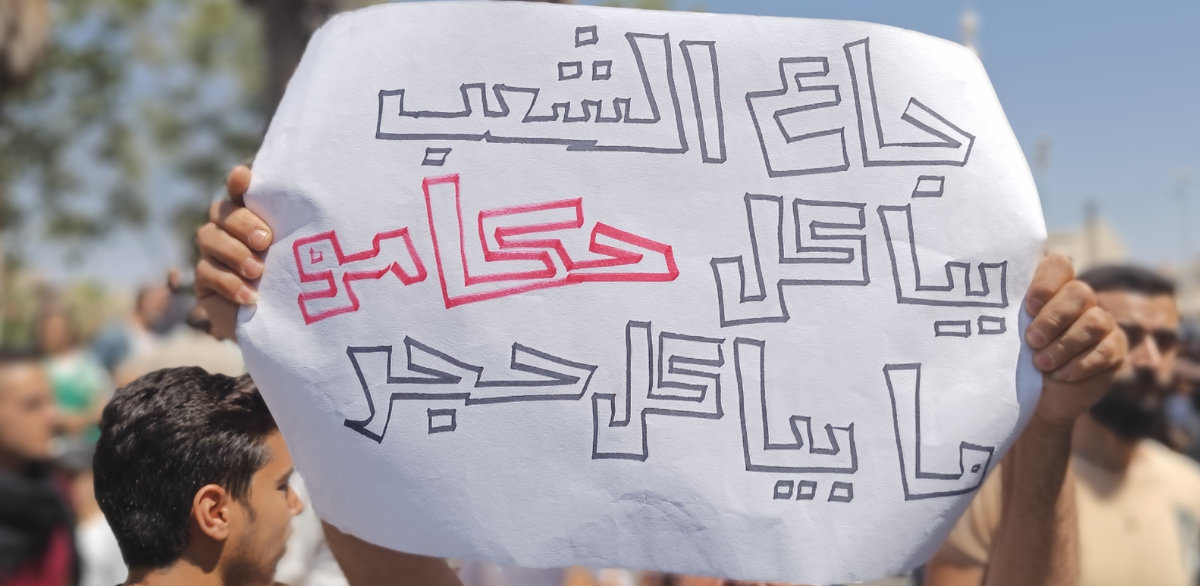
“When people are hungry they eat their leaders, they don’t eat stones”, screams one placard in Arabic during a demonstration against dire living conditions in the southern Syrian city of Sweida on August 23, 2023. (Suwayda 24 handout photo via AFP)
“For Syria, without addressing the political consequences of this crisis, the deep economic crisis and humanitarian suffering will also continue.”
Huda Al-Ahmad, 50, who is the sole breadwinner in her household, lost her job months ago. She said her family have suffered for more than a year since the Damascus-based charity Al-Mabarrat stopped providing basic foodstuffs to her neighborhood.
“Coffee used to be a daily necessity for every household in Damascus. It is now a luxury,” she told Arab News. “We never thought twice before buying it but now we cannot afford an ounce a month. It would cost 5,000 Syrian pounds to make three shots of coffee.”
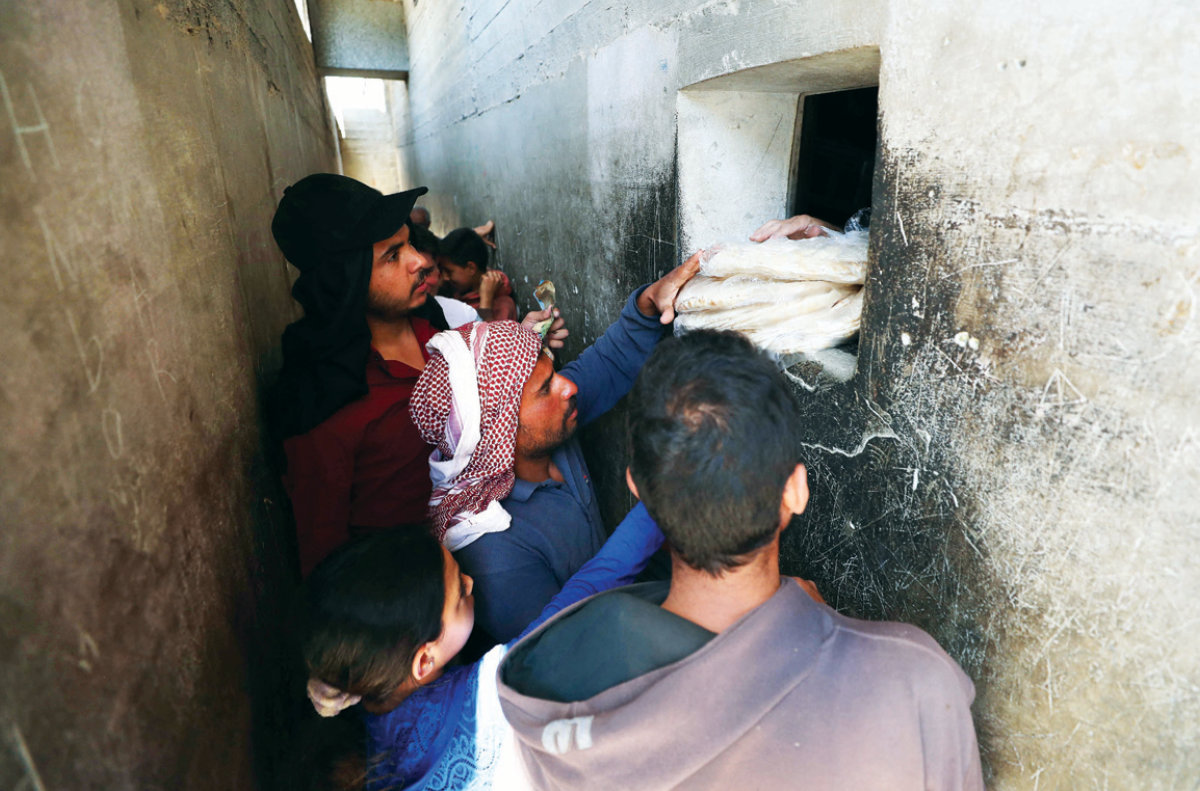
Syrians waiting in a queue to buy bread at a shop in Binnish, in northwestern Idlib province. The current economic situation may be worse than it was during the height of the conflict. (AFP file photo)
Meanwhile, the daily commute to Damascus from Sitt Zaynab in Rif Dimashq, where Al-Ahmad lives, costs at least 4,000 Syrian pounds.
“My daughter and I have been ill for nearly a week, unable even to afford paracetamol,” she said. “We have not bought any kind of fruit, meat or dessert for almost a year unless we give up rice and wheat for a couple of months.”
Analysts believe policies that could boost economic activity, reduce tax evasion, combat corruption and cut military expenditure are infeasible as they would require political will, engagement with civil society in the decision-making process, and representative institutions.
“These prerequisites are impossible to reach under the existing socioeconomic and political structures,” said Al-Asadi.

The protests in Sweida province, the heartland of the country’s Druze minority, began after the Syrian government ended fuel subsidies in August, dealing a heavy blow to Syrians reeling from war and a crippling economic crisis. (AFP)
Instead, he added, the current policies will “deepen (the) poverty gap, as tens of thousands of poor Syrian households are expected to fall way below the overall poverty line into extreme poverty. Lifting subsidies is the easiest and fastest way to reduce the budget deficit.”
Despite the rapidly declining living standards, nongovernmental organizations and the Damascus municipality recently collaborated on giving one of the capital’s public spaces a makeover.
Photos of the revamped Sabaa Bahrat (Seven Fountains) Square, in the vicinity of the central bank, recently went viral on social media, prompting critics to comment that it was distasteful to spend money on urban beautification when so many people in the country were experiencing power cuts and shortages of food and fuel.
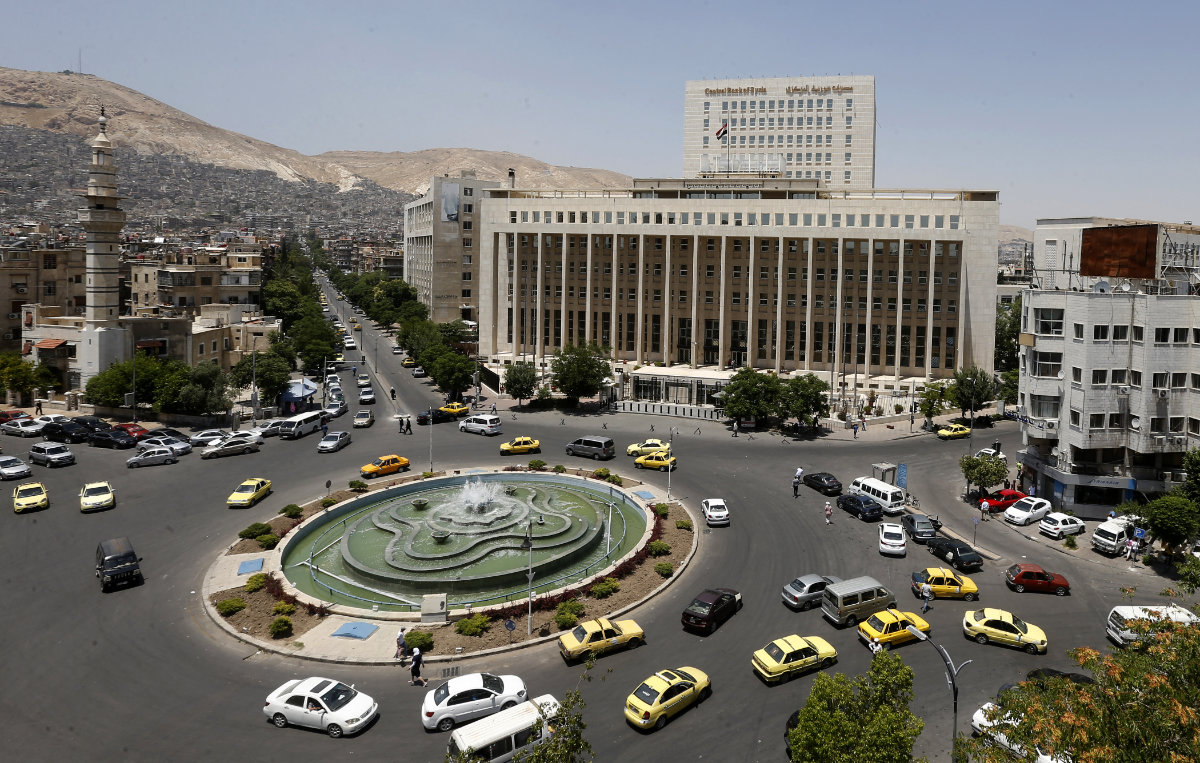
This photo taken on June 17, 2020, shows a view of the Sabaa Bahrat (Seven Fountains) Square roundabout in front of the Central bank of Syria in Damascus. (AFP)
“The Sabaa Bahrat roundabout will not provide bread,” Al-Hussain Al-Nayef, chairman of the Syrian National Media Alliance, said in a message posted on Facebook. “What do we gain from this cultural achievement when the impoverished citizens anticipate real change — one that addresses their concerns and lost happiness?”
The renovation was fully funded by private donors, according to reports in January, which quoted Mohammed Eyad Al-Shamaa, chairman of the Damascus Governorate Council, as rejecting claims that the renovation work cost about 5 billion Syrian pounds.
Many local social media commentators said the funds should have been used to help feed the poor and install solar energy solutions to provide street lighting in Damascus, which, like much of the country, suffers regular power shortages.

In this picture taken during a demonstration in Sweida on August 21, 2023, a placard in Arabic reads: “Bashar al-Assad achieved victory only over his people but he didn’t defeat Israel.” (SUWAYDA24 photo via AFP)
“Syria’s GDP (gross domestic product) and its annual budget have dwindled significantly from their pre-Arab Spring levels,” said Otrakji, the Syrian Canadian analyst. “The Syrian government currently operates with severely limited financial resources, a situation that is far from sustainable in the long run.
“In this precarious financial state, Syria is poised to seek assistance, either from willing Arab states or by deepening its reliance on Iran.”
He lamented the fact that “beyond the stark divergence in expectations regarding the elusive political solution in Syria,” the country has become “a fertile ground for regional and international conflicts.”
He added: “Regrettably, none of these conflicts show signs of nearing resolution, further entrenching Syria as a battleground for competing interests.”
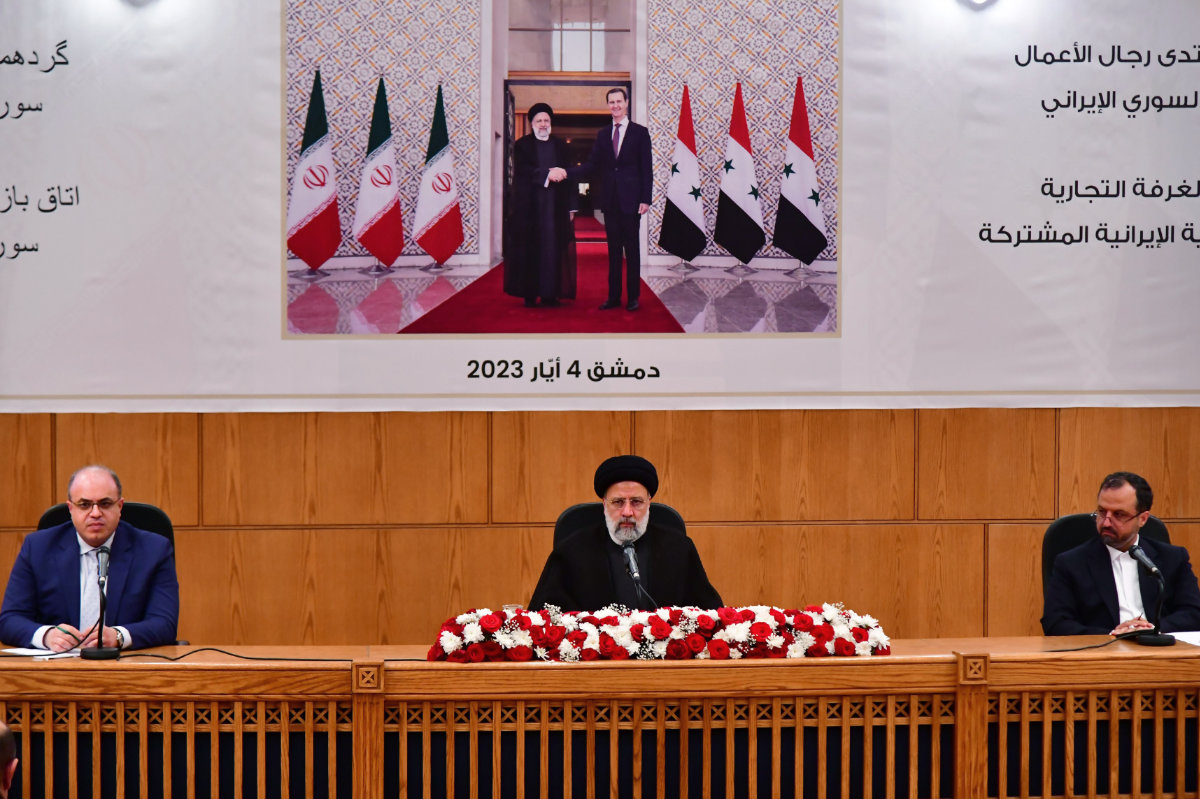
This picture released by the official Syrian Arab News Agency on May 4, 2023, shows Iranian President Ebrahim Raisi (C) attending a business forum in Damascus. (SANA handout via AFP)
Azzam, from the civil society group Juzour, is convinced that the Syrian regime is incapable of reviving the moribund economy without some progress on the political front.
“The country is in ruins — economically, socially, culturally and intellectually,” he said. “This has produced a pressing need for a fresh social agreement that marks a significant phase in which Syria is for all citizens and an integral part of the global community.
“Given the circumstances, all attempts to improve the economic situation will likely fail. And even if they do succeed, it would be a temporary, unsustainable success.”

>>> Read full article>>>
Copyright for syndicated content belongs to the linked Source : Arab News – https://www.arabnews.com/node/2374946/middle-east










